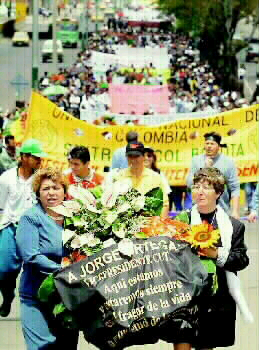In Colombia is easier to kill trade unionists than to negotiate with them
 According to a study by the International Commission for Labour Rights, Colombian workers' representatives are among the most persecuted of the world.
According to a study by the International Commission for Labour Rights, Colombian workers' representatives are among the most persecuted of the world.

No question, trade unionism has been one of the most risky occupations –if carried on with honesty- all along world's history. However, in Colombia, the situation turned out of control, as the South American country cannot leave behind its violent present. According to a study by the International Commission for Labour Rights (ICLR) –a London based NGO- to shoot a trade unionist in Colombia is cheaper than to negotiate with him.
The research concludes that in Colombia it's quicker, cheaper and less risky to kill trade unionists involved in an employment dispute than it is to use legal civil procedures to solve the dispute. Also, according to ICLR, it is an astonishing fact that over three quarters of those individuals who have been murdered are Colombian. In 2002 the death toll was 184, in 2003 there were 90 murders. Alongside the murders came countless death threats, kidnappings, torture, arrests, and attempted assassinations.
Colombia's justice has also played its part in this astonishing reality: “in respect of almost 4,000 murders of trade unionists since 1986 – reads the ICLR report- there has been almost 100 percent impunity. There were just five convictions for these murders between 1986 and 2002”.
In the last week of March 2004 the International Commission for Labour Rights sent a mission of legal experts to Colombia to investigate violations of the right to life and liberty of trade unionists, the crisis of impunity that surrounds these violations and the systemic and systematic failings in the Colombian justice system that allow the violations to continue. The participants were Teodoro Sбnchez de Bustamante, - Labour Lawyers Association, Argentina-, Sarah Lucy Cooper -Bar Human Rights Committee, UK- and Efren Sandoval -UNSITRAGUA, Guatemala-.
The ICLR blames the Colombian government of failing “to guarantee the full enjoyment and protection of fundamental rights, (as) the conditions required for the full exercise of Trade Union Freedom do not exist, and accordingly, there is a constant direct and indirect violation of Conventions 87, 98 and 154 by the Colombian Government.
The report also remarks that “the situation in which trade unionists find themselves in is extremely concerning as whilst the Colombian Government accepts that they are being targeted, the virtual total impunity in which the cases of murder remain means that there is no real deterrent for the perpetrators of the killings. “The sad reality is that it is probably quicker, cheaper and less risky to murder trade unionists involved in an employment dispute than it is to use the civil procedures laid down for the resolution of such disputes by arbitration or litigation”, concludes the study.
ILCR's website reads that the International Commission for Labour Rights was formed in response to an urgent need to defend the fundamental rights of working people worldwide. The initiative for the Commission lies with the International Association of Democratic Lawyers and the International Centre for Trade Union Rights.
Photo: Funeral of Jorge Ortega, former vice president of Colombia's main union's confederation, assassinated in 1998.
Subscribe to Pravda.Ru Telegram channel, Facebook, RSS!


